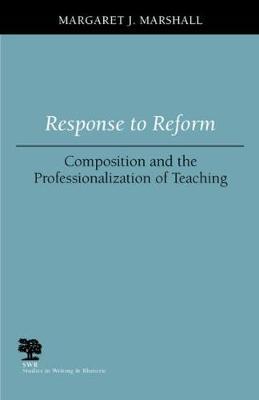Overview
Response to Reform: Composition and the Professionalization of Teaching critiques the politics of labor and gender biases inherent in the composition workplace that prevent literacy teachers from attaining professional status and respect. Scrutinizing the relationship between scholarship and teaching, Margaret J. Marshall calls for a reconceptualization of what it means to prepare for and enter the field of composition instruction. Interrogating the approach the education system takes to certify teachers without actually ""professionalizing"" their careers, Marshall contends that these programs rely on outdated rhetorics of labor that only widen the gap between teaching and other professional jobs. Such attempts to re-educate literacy teachers exploit and marginalize their work, and thus prevent them from claiming the status of academic professionals. In providing an overview of the history of and language used to literacy instruction, she also points out that while women are overrepresented in composition instruction, they are underrepresented in tenure track and administrative positions. To correct and combat these inequities, Marshall advocates an alternate alignment of power structures and rhetorical choices. In a wide-ranging survey that sheds new light on the composition workplace as well as higher education at large, Response to Reform: Composition and the Professionalization of Teaching boldly asks us to do away with the reductive language we inherit from the past that characterize teaching and professionalization, as well as our customary responses to public criticism of education. The result is a new articulation of composition as a meritorious profession.
Full Product Details
Author: Margaret J. Marshall ,
Robert Brooke
Publisher: Southern Illinois University Press
Imprint: Southern Illinois University Press
Dimensions:
Width: 13.90cm
, Height: 1.30cm
, Length: 21.60cm
Weight: 0.254kg
ISBN: 9780809325450
ISBN 10: 0809325454
Pages: 176
Publication Date: 25 November 2003
Audience:
College/higher education
,
Professional and scholarly
,
Undergraduate
,
Postgraduate, Research & Scholarly
Format: Paperback
Publisher's Status: Out of Print
Availability: Out of stock

Reviews
Margaret J. Marshall's Response to Reform is a thoughtful study of a perennially important subject, reforming college writing instruction. Marshall bases her critique on her own years of experience directing a large, complex writing program. She is particularly insightful about how well-intentioned reform efforts like the Boyer Report run up against entrenched attitudes and structures within higher education. --John Brereton, Brandeis University Margaret J. Marshall s Response to Reform is a thoughtful study of a perennially important subject, reforming college writing instruction. Marshall bases her critique on her own years of experience directing a large, complex writing program. She is particularly insightful about how well-intentioned reform efforts like the Boyer Report run up against entrenched attitudes and structures within higher education. John Brereton, Brandeis University Margaret J. Marshall s Response to Reform is a thoughtful study of a perennially important subject, reforming college writing instruction. Marshall bases her critique on her own years of experience directing a large, complex writing program. She is particularly insightful about how well-intentioned reform efforts like the Boyer Report run up against entrenched attitudes and structures within higher education. John Brereton, Brandeis University Margaret J. Marshall's Response to Reform is a thoughtful study of a perennially important subject, reforming college writing instruction. Marshall bases her critique on her own years of experience directing a large, complex writing program. She is particularly insightful about how well-intentioned reform efforts like the Boyer Report run up against entrenched attitudes and structures within higher education. --John Brereton, Brandeis University 0;Margaret J. Marshall7;s Response to Reform is a thoughtful study of a perennially important subject, reforming college writing instruction. Marshall bases her critique on her own years of experience directing a large, complex writing program. She is particularly insightful about how well-intentioned reform efforts like the Boyer Report run up against entrenched attitudes and structures within higher education.1; 2;John Brereton, Brandeis University Margaret J. Marshall ' s Response to Reform is a thoughtful study of a perennially important subject, reforming college writing instruction. Marshall bases her critique on her own years of experience directing a large, complex writing program. She is particularly insightful about how well-intentioned reform efforts like the Boyer Report run up against entrenched attitudes and structures within higher education. -- John Brereton, Brandeis University& nbsp;
Margaret J. Marshall's Response to Reform is a thoughtful study of a perennially important subject, reforming college writing instruction. Marshall bases her critique on her own years of experience directing a large, complex writing program. She is particularly insightful about how well-intentioned reform efforts like the Boyer Report run up against entrenched attitudes and structures within higher education. --John Brereton, Brandeis University
Margaret J. Marshall s Response to Reform is a thoughtful study of a perennially important subject, reforming college writing instruction. Marshall bases her critique on her own years of experience directing a large, complex writing program. She is particularly insightful about how well-intentioned reform efforts like the Boyer Report run up against entrenched attitudes and structures within higher education. John Brereton, Brandeis University
Author Information
Margaret J. Marshall, an associate professor of English at the University of Miami, is the author of Contesting Cultural Rhetorics: Public Discourse and Education.




